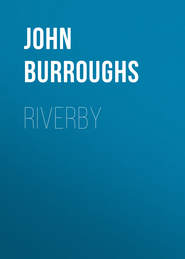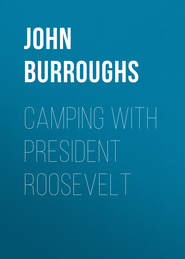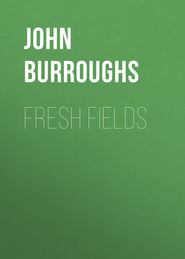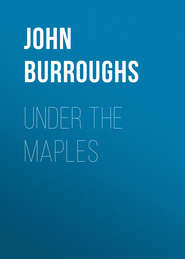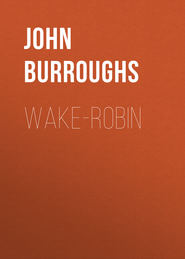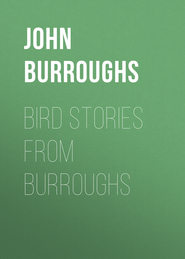По всем вопросам обращайтесь на: info@litportal.ru
(©) 2003-2024.
✖
Camping & Tramping with Roosevelt
Настройки чтения
Размер шрифта
Высота строк
Поля
"No," said the President. "Put me up a lunch, and let me go alone. I will surely come back."
And back he surely came. It was about five o'clock when he came briskly down the path from the east to the camp. It came out that he had tramped about eighteen miles through a very rough country. The day before, he and the major had located a band of several hundred elk on a broad, treeless hillside, and his purpose was to find those elk, and creep up on them, and eat his lunch under their very noses. And this he did, spending an hour or more within fifty yards of them. He came back looking as fresh as when he started, and at night, sitting before the big camp fire, related his adventure, and talked with his usual emphasis and copiousness of many things. He told me of the birds he had seen or heard; among them he had heard one that was new to him. From his description I told him I thought it was Townsend's solitaire, a bird I much wanted to see and hear. I had heard the West India solitaire, – one of the most impressive songsters I ever heard, – and I wished to compare our Western form with it.
The next morning we set out for our second camp, ten or a dozen miles away, and in reaching it passed over much of the ground the President had traversed the day before. As we came to a wild, rocky place above a deep chasm of the river, with a few scattered pine trees, the President said, "It was right here that I heard that strange bird song." We paused a moment. "And there it is now!" he exclaimed.
Sure enough, there was the solitaire singing from the top of a small cedar, – a bright, animated, eloquent song, but without the richness and magic of the song of the tropical species. We hitched our horses, and followed the bird up as it flew from tree to tree. The President was as eager to see and hear it as I was. It seemed very shy, and we only caught glimpses of it. In form and color it much resembles its West India cousin, and suggests our catbird. It ceased to sing when we pursued it. It is a bird found only in the wilder and higher parts of the Rockies. My impression was that its song did not quite merit the encomiums that have been pronounced upon it.
At this point, I saw amid the rocks my first and only Rocky Mountain woodchucks, and, soon after we had resumed our journey, our first blue grouse, – a number of them like larger partridges. Occasionally we would come upon black-tailed deer, standing or lying down in the bushes, their large ears at attention being the first thing to catch the eye. They would often allow us to pass within a few rods of them without showing alarm. Elk horns were scattered all over this part of the Park, and we passed several old carcasses of dead elk that had probably died a natural death.
In a grassy bottom at the foot of a steep hill, while the President and I were dismounted, and noting the pleasing picture which our pack train of fifteen or twenty mules made filing along the side of a steep grassy slope, – a picture which he has preserved in his late volume, "Out-Door Pastimes of an American Hunter," – our attention was attracted by plaintive, musical, bird-like chirps that rose from the grass about us. I was almost certain it was made by a bird; the President was of like opinion; and we kicked about in the tufts of grass, hoping to flush the bird. Now here, now there, arose this sharp, but bird-like note. Finally, we found that it was made by a species of gopher, whose holes we soon discovered. What its specific name is I do not know, but it should be called the singing gopher.
Our destination this day was a camp on Cottonwood Creek, near "Hell-Roaring Creek." As we made our way in the afternoon along a broad, open, grassy valley, I saw a horseman come galloping over the hill to our right, starting up a band of elk as he came; riding across the plain, he wheeled his horse, and, with the military salute, joined our party. He proved to be a government scout, called the "Duke of Hell Roaring," – an educated officer from the Austrian army, who, for some unknown reason, had exiled himself here in this out-of-the-way part of the world. He was a man in his prime, of fine, military look and bearing. After conversing a few moments with the President and Major Pitcher, he rode rapidly away.
Our second camp, which we reached in mid-afternoon, was in the edge of the woods on the banks of a fine, large trout stream, where ice and snow still lingered in patches. I tried for trout in the head of a large, partly open pool, but did not get a rise; too much ice in the stream, I concluded. Very soon my attention was attracted by a strange note, or call, in the spruce woods. The President had also noticed it, and, with me, wondered what made it. Was it bird or beast? Billy Hofer said he thought it was an owl, but the sound in no way suggested an owl, and the sun was shining brightly. It was a sound such as a boy might make by blowing in the neck of an empty bottle. Presently we heard it beyond us on the other side of the creek, which was pretty good proof that the creature had wings.
"Let's go run that bird down," said the President to me.
So off we started across a small, open, snow-streaked plain, toward the woods beyond it. We soon decided that the bird was on the top of one of a group of tall spruces. After much skipping about over logs and rocks, and much craning of our necks, we made him out on the peak of a spruce. I imitated his call, when he turned his head down toward us, but we could not make out what he was.
"Why did we not think to bring the glasses?" said the President.
"I will run and get them," I replied.
"No," said he, "you stay here and keep that bird treed, and I will fetch them."
So off he went like a boy, and was very soon back with the glasses. We quickly made out that it was indeed an owl, – the pigmy owl, as it turned out, – not much larger than a bluebird. I think the President was as pleased as if we had bagged some big game. He had never seen the bird before.
Throughout the trip I found his interest in bird life very keen, and his eye and ear remarkably quick. He usually saw the bird or heard its note as quickly as I did, – and I had nothing else to think about, and had been teaching my eye and ear the trick of it for over fifty years. Of course, his training as a big-game hunter stood him in good stead, but back of that were his naturalist's instincts, and his genuine love of all forms of wild life.
I have been told that his ambition up to the time he went to Harvard had been to be a naturalist, but that there they seem to have convinced him that all the out-of-door worlds of natural history had been conquered, and that the only worlds remaining were in the laboratory, and to be won with the microscope and the scalpel. But Roosevelt was a man made for action in a wide field, and laboratory conquests could not satisfy him. His instincts as a naturalist, however, lie back of all his hunting expeditions, and, in a large measure, I think, prompt them. Certain it is that his hunting records contain more live natural history than any similar records known to me, unless it be those of Charles St. John, the Scotch naturalist-sportsman.
The Canada jays, or camp-robbers, as they are often called, soon found out our camp that afternoon, and no sooner had the cook begun to throw out peelings and scraps and crusts than the jays began to carry them off, not to eat, as I observed, but to hide them in the thicker branches of the spruce trees. How tame they were, coming within three or four yards of one! Why this species of jay should everywhere be so familiar, and all other kinds so wild, is a puzzle.
In the morning, as we rode down the valley toward our next camping-place, at Tower Falls, a band of elk containing a hundred or more started along the side of the hill a few hundred yards away. I was some distance behind the rest of the party, as usual, when I saw the President wheel his horse off to the left, and, beckoning to me to follow, start at a tearing pace on the trail of the fleeing elk. He afterwards told me that he wanted me to get a good view of those elk at close range, and he was afraid that if he sent the major or Hofer to lead me, I would not get it. I hurried along as fast as I could, which was not fast; the way was rough, – logs, rocks, spring runs, and a tenderfoot rider.
Now and then the President, looking back and seeing what slow progress I was making, would beckon to me impatiently, and I could fancy him saying, "If I had a rope around him, he would come faster than that!" Once or twice I lost sight of both him and the elk; the altitude was great, and the horse was laboring like a steam engine on an upgrade. Still I urged him on. Presently, as I broke over a hill, I saw the President pressing the elk up the opposite slope. At the brow of the hill he stopped, and I soon joined him. There on the top, not fifty yards away, stood the elk in a mass, their heads toward us and their tongues hanging out. They could run no farther. The President laughed like a boy. The spectacle meant much more to him than it did to me. I had never seen a wild elk till on this trip, but they had been among the notable game that he had hunted. He had traveled hundreds of miles, and undergone great hardships, to get within rifle range of these creatures. Now here stood scores of them with lolling tongues, begging for mercy.
After gazing at them to our hearts' content, we turned away to look up our companions, who were nowhere within sight. We finally spied them a mile or more away, and, joining them, all made our way to an elevated plateau that commanded an open landscape three or four miles across. It was high noon, and the sun shone clear and warm. From this lookout we saw herds upon herds of elk scattered over the slopes and gentle valleys in front of us. Some were grazing, some were standing or lying upon the ground, or upon the patches of snow. Through our glasses we counted the separate bands, and then the numbers of some of the bands or groups, and estimated that three thousand elk were in full view in the landscape around us. It was a notable spectacle. Afterward, in Montana, I attended a council of Indian chiefs at one of the Indian agencies, and told them, through their interpreter, that I had been with the Great Chief in the Park, and of the game we had seen. When I told them of these three thousand elk all in view at once, they grunted loudly, whether with satisfaction or with incredulity, I could not tell.
In the midst of this great game amphitheatre we dismounted and enjoyed the prospect. And the President did an unusual thing, he loafed for nearly an hour, – stretched himself out in the sunshine upon a flat rock, as did the rest of us, and, I hope, got a few winks of sleep. I am sure I did. Little, slender, striped chipmunks, about half the size of ours, were scurrying about; but I recall no other wild things save the elk.
From here we rode down the valley to our third camp, at Tower Falls, stopping on the way to eat our luncheon on a washed boulder beside a creek. On this ride I saw my first and only badger; he stuck his striped head out of his hole in the ground only a few yards away from us as we passed.
Our camp at Tower Falls was amid the spruces above a cañon of the Yellowstone, five or six hundred feet deep. It was a beautiful and impressive situation, – shelter, snugness, even cosiness, looking over the brink of the awful and the terrifying. With a run and a jump I think one might have landed in the river at the bottom of the great abyss, and in doing so might have scaled one of those natural obelisks or needles of rock that stand up out of the depths two or three hundred feet high. Nature shows you what an enormous furrow her plough can open through the strata when moving horizontally, at the same time that she shows you what delicate and graceful columns her slower and gentler aerial forces can carve out of the piled strata. At the Falls there were two or three of these columns, like the picket-pins of the elder gods.
Across the cañon in front of our camp, upon a grassy plateau which was faced by a wall of trap rock, apparently thirty or forty feet high, a band of mountain sheep soon attracted our attention. They were within long rifle range, but were not at all disturbed by our presence, nor had they been disturbed by the road-builders who, under Captain Chittenden, were constructing a government road along the brink of the cañon. We speculated as to whether or not the sheep could get down the almost perpendicular face of the chasm to the river to drink. It seemed to me impossible. Would they try it while we were there to see? We all hoped so; and sure enough, late in the afternoon the word came to our tents that the sheep were coming down. The President, with coat off and a towel around his neck, was shaving. One side of his face was half shaved, and the other side lathered. Hofer and I started for a point on the brink of the cañon where we could have a better view.
"By Jove," said the President, "I must see that. The shaving can wait, and the sheep won't."
So on he came, accoutred as he was, – coatless, hatless, but not latherless, nor towelless. Like the rest of us, his only thought was to see those sheep do their "stunt." With glasses in hand, we watched them descend those perilous heights, leaping from point to point, finding a foothold where none appeared to our eyes, loosening fragments of the crumbling rocks as they came, now poised upon some narrow shelf and preparing for the next leap, zig-zagging or plunging straight down till the bottom was reached, and not one accident or misstep amid all that insecure footing. I think the President was the most pleased of us all; he laughed with the delight of it, and quite forgot his need of a hat and coat till I sent for them.
In the night we heard the sheep going back; we could tell by the noise of the falling stones. In the morning I confidently expected to see some of them lying dead at the foot of the cliffs, but there they all were at the top once more, apparently safe and sound. They do, however, occasionally meet with accidents in their perilous climbing, and their dead bodies have been found at the foot of the rocks. Doubtless some point of rock to which they had trusted gave way, and crushed them in the descent, or fell upon those in the lead.
The next day, while the rest of us went fishing for trout in the Yellowstone, three or four miles above the camp, over the roughest trail that we had yet traversed on horseback, the President, who never fishes unless put to it for meat, went off alone again with his lunch in his pocket, to stalk those sheep as he had stalked the elk, and to feel the old sportsman's thrill without the use of firearms. To do this involved a tramp of eight or ten miles down the river to a bridge and up the opposite bank. This he did, and ate his lunch near the sheep, and was back in camp before we were.
We took some large cut-throat trout, as they are called, from the yellow mark across their throats, and I saw at short range a black-tailed deer bounding along in that curious, stiff-legged, mechanical, yet springy manner, apparently all four legs in the air at once, and all four feet reaching the ground at once, affording a very singular spectacle.
We spent two nights in our Tower Falls camp, and on the morning of the third day set out on our return to Fort Yellowstone, pausing at Yancey's on our way, and exchanging greetings with the old frontiersman, who died a few weeks later.
While in camp we always had a big fire at night in the open near the tents, and around this we sat upon logs or camp-stools, and listened to the President's talk. What a stream of it he poured forth! and what a varied and picturesque stream! – anecdote, history, science, politics, adventure, literature; bits of his experience as a ranchman, hunter, Rough Rider, legislator, civil service commissioner, police commissioner, governor, president, – the frankest confessions, the most telling criticisms, happy characterizations of prominent political leaders, or foreign rulers, or members of his own Cabinet; always surprising by his candor, astonishing by his memory, and diverting by his humor. His reading has been very wide, and he has that rare type of memory which retains details as well as mass and generalities. One night something started him off on ancient history, and one would have thought he was just fresh from his college course in history, the dates and names and events came so readily. Another time he discussed palæontology, and rapidly gave the outlines of the science, and the main facts, as if he had been reading up on the subject that very day. He sees things as wholes, and hence the relation of the parts comes easy to him.
At dinner, at the White House, the night before we started on the expedition, I heard him talking with a guest, – an officer of the British army, who was just back from India. And the extent and variety of his information about India and Indian history and the relations of the British government to it were extraordinary. It put the British major on his mettle to keep pace with him.
One night in camp he told us the story of one of his Rough Riders who had just written him from some place in Arizona. The Rough Riders, wherever they are now, look to him in time of trouble. This one had come to grief in Arizona. He was in jail. So he wrote the President, and his letter ran something like this: —
"Dear Colonel, – I am in trouble. I shot a lady in the eye, but I did not intend to hit the lady; I was shooting at my wife."
And the presidential laughter rang out over the tree-tops. To another Rough Rider, who was in jail, accused of horse stealing, he had loaned two hundred dollars to pay counsel on his trial, and, to his surprise, in due time the money came back. The ex-Rough wrote that his trial never came off. "We elected our district attorney;" and the laughter again sounded, and drowned the noise of the brook near by.
On another occasion we asked the President if he was ever molested by any of the "bad men" of the frontier, with whom he had often come in contact. "Only once," he said. The cowboys had always treated him with the utmost courtesy, both on the round-up and in camp; "and the few real desperadoes I have seen were also perfectly polite." Once only was he maliciously shot at, and then not by a cowboy nor a bona fide "bad man," but by a "broad-hatted ruffian of a cheap and common-place type." He had been compelled to pass the night at a little frontier hotel where the bar-room occupied the whole lower floor, and was, in consequence, the only place where the guests of the hotel, whether drunk or sober, could sit. As he entered the room, he saw that every man there was being terrorized by a half-drunken ruffian who stood in the middle of the floor with a revolver in each hand, compelling different ones to treat.
"I went and sat down behind the stove," said the President, "as far from him as I could get; and hoped to escape his notice. The fact that I wore glasses, together with my evident desire to avoid a fight, apparently gave him the impression that I could be imposed upon with impunity. He very soon approached me, flourishing his two guns, and ordered me to treat. I made no reply for some moments, when the fellow became so threatening that I saw something had to be done. The crowd, mostly sheep-herders and small grangers, sat or stood back against the wall, afraid to move. I was unarmed, and thought rapidly. Saying, 'Well, if I must, I must,' I got up as if to walk around him to the bar, then, as I got opposite him, I wheeled and fetched him as heavy a blow on the chin-point as I could strike. He went down like a steer before the axe, firing both guns into the ceiling as he went. I jumped on him, and, with my knees on his chest, disarmed him in a hurry. The crowd was then ready enough to help me, and we hog-tied him and put him in an outhouse." The President alludes to this incident in his "Ranch Life," but does not give the details. It brings out his mettle very distinctly.
He told us in an amused way of the attempts of his political opponents at Albany, during his early career as a member of the Assembly, to besmirch his character. His outspoken criticisms and denunciations had become intolerable to them, so they laid a trap for him, but he was not caught. His innate rectitude and instinct for the right course saved him, as it has saved him many times since. I do not think that in any emergency he has to debate with himself long as to the right course to be pursued; he divines it by a kind of infallible instinct. His motives are so simple and direct that he finds a straight and easy course where another man, whose eye is less single, would flounder and hesitate.
One night he entertained us with reminiscences of the Cuban War, of his efforts to get his men to the firing line when the fighting began, of his greenness and general ignorance of the whole business of war, which in his telling was very amusing. He has probably put it all in his book about the war, a work I have not yet read. He described the look of the slope of Kettle Hill when they were about to charge up it, how the grass was combed and rippled by the storm of rifle bullets that swept down it. He said, "I was conscious of being pale when I looked at it and knew that in a few moments we were going to charge there." The men of his regiment were all lying flat upon the ground, and it became his duty to walk along their front and encourage them and order them up on their feet. "Get up, men, get up!" One big fellow did not rise. Roosevelt stooped down and took hold of him and ordered him up. Just at that moment a bullet struck the man and went the entire length of him. He never rose.
On this or on another occasion when a charge was ordered, he found himself a hundred yards or more in advance of his regiment, with only the color bearer and one corporal with him. He said they planted the flag there, while he rushed back to fetch the men. He was evidently pretty hot. "Can it be that you flinched when I led the way!" and then they came with a rush. On the summit of Kettle Hill he was again in advance of his men, and as he came up, three Spaniards rose out of the trenches and deliberately fired at him at a distance of only a few paces, and then turned and fled. But a bullet from his revolver stopped one of them. He seems to have been as much exposed to bullets in this engagement as Washington was at Braddock's defeat, and to have escaped in the same marvelous manner.
The President unites in himself powers and qualities that rarely go together. Thus, he has both physical and moral courage in a degree rare in history. He can stand calm and unflinching in the path of a charging grizzly, and he can confront with equal coolness and determination the predaceous corporations and money powers of the country.
He unites the qualities of the man of action with those of the scholar and writer, – another very rare combination. He unites the instincts and accomplishments of the best breeding and culture with the broadest democratic sympathies and affiliations. He is as happy with a frontiersman like Seth Bullock as with a fellow Harvard man, and Seth Bullock is happy, too.
He unites great austerity with great good nature. He unites great sensibility with great force and will power. He loves solitude, and he loves to be in the thick of the fight. His love of nature is equaled only by his love of the ways and marts of men.
He is doubtless the most vital man on the continent, if not on the planet, to-day. He is many-sided, and every side throbs with his tremendous life and energy; the pressure is equal all around. His interests are as keen in natural history as in economics, in literature as in statecraft, in the young poet as in the old soldier, in preserving peace as in preparing for war. And he can turn all his great power into the new channel on the instant. His interest in the whole of life, and in the whole life of the nation, never flags for a moment. His activity is tireless. All the relaxation he needs or craves is a change of work. He is like the farmer's fields, that only need a rotation of crops. I once heard him say that all he cared about being President was just "the big work."
During this tour through the West, lasting over two months, he made nearly three hundred speeches; and yet on his return Mrs. Roosevelt told me he looked as fresh and unworn as when he left home.
We went up into the big geyser region with the big sleighs, each drawn by four horses. A big snow-bank had to be shoveled through for us before we got to the Golden Gate, two miles above Mammoth Hot Springs. Beyond that we were at an altitude of about eight thousand feet, on a fairly level course that led now through woods, and now through open country, with the snow of a uniform depth of four or five feet, except as we neared the "formations," where the subterranean warmth kept the ground bare. The roads had been broken and the snow packed for us by teams from the fort, otherwise the journey would have been impossible.
The President always rode beside the driver. From his youth, he said, this seat had always been the most desirable one to him. When the sleigh would strike the bare ground, and begin to drag heavily, he would bound out nimbly and take to his heels, and then all three of us – Major Pitcher, Mr. Childs, and myself – would follow suit, sometimes reluctantly on my part. Walking at that altitude is no fun, especially if you try to keep pace with such a walker as the President is. But he could not sit at his ease and let those horses drag him in a sleigh over bare ground. When snow was reached, we would again quickly resume our seats.
As one nears the geyser region, he gets the impression from the columns of steam going up here and there in the distance – now from behind a piece of woods, now from out a hidden valley – that he is approaching a manufacturing centre, or a railroad terminus. And when he begins to hear the hoarse snoring of "Roaring Mountain," the illusion is still more complete. At Norris's there is a big vent where the steam comes tearing out of a recent hole in the ground with terrific force. Huge mounds of ice had formed from the congealed vapor all around it, some of them very striking.
The novelty of the geyser region soon wears off. Steam and hot water are steam and hot water the world over, and the exhibition of them here did not differ, except in volume, from what one sees by his own fireside. The "Growler" is only a boiling tea-kettle on a large scale, and "Old Faithful" is as if the lid were to fly off, and the whole contents of the kettle should be thrown high into the air. To be sure, boiling lakes and steaming rivers are not common, but the new features seemed, somehow, out of place, and as if nature had made a mistake. One disliked to see so much good steam and hot water going to waste; whole towns might be warmed by them, and big wheels made to go round. I wondered that they had not piped them into the big hotels which they opened for us, and which were warmed by wood fires.
At Norris's the big room that the President and I occupied was on the ground floor, and was heated by a huge box stove. As we entered it to go to bed, the President said, "Oom John, don't you think it is too hot here?"






